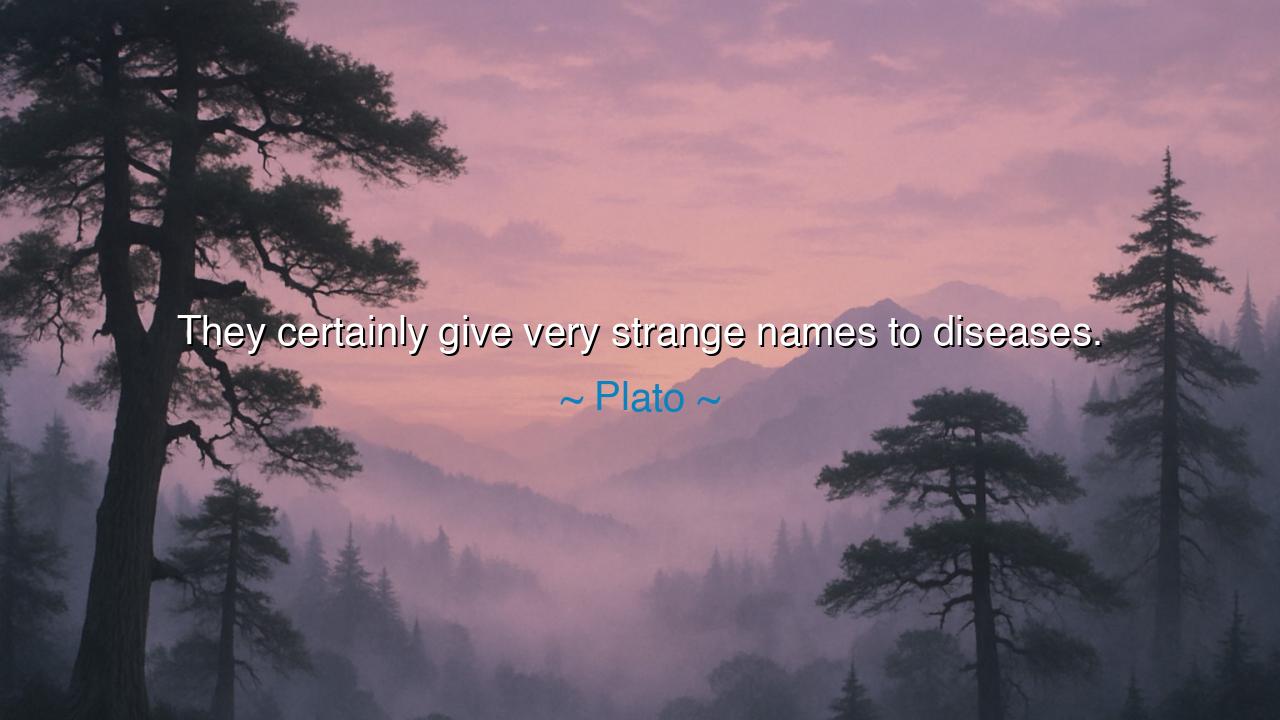
They certainly give very strange names to diseases.






The words of Plato—“They certainly give very strange names to diseases”—appear lighthearted, almost a passing jest, yet within them lies a profound reflection on the nature of human knowledge. Plato, the great philosopher of Athens, often clothed wisdom in humor, for he knew that laughter softens the ear to truth. In this observation, he reminds us that the way we name things shapes how we see them. A disease clothed in a complex, foreign-sounding name may appear more mysterious, even more terrifying, than the suffering it describes. The strangeness of the name becomes a veil, distancing the healer and the patient from the simple reality of pain and the search for healing.
The ancients believed that to name something was to have power over it. The Egyptians spoke sacred names for protection; the Hebrews revered the name of God as too holy to utter; the Greeks themselves wove names into myths that defined the world. So too with diseases: when physicians of Plato’s time gave them elaborate titles, they cloaked human suffering in language that seemed learned, yet perhaps obscured the essence. Plato’s remark cuts through this veil, hinting that the true healer must look not to the ornament of words but to the reality of the human body and soul.
History offers us many examples of this paradox. In the Middle Ages, the plague was called the Black Death, a name that struck terror into the heart of Europe. Yet the name itself offered no understanding of the pestilence, only dread. In contrast, when modern science discovered the bacterium Yersinia pestis, and traced the fleas and rats that carried it, humanity began to master what once was a nameless terror. Thus, Plato’s observation holds: names may confuse or clarify, inspire awe or bring understanding. It is not the strangeness of the name that matters, but whether it draws us closer to truth.
Yet there is also a gentler meaning in his words. For sometimes strange names are given to soften the blow of harsh realities. In war, wounds of the mind were once dismissed as cowardice; later they were called “shell shock”; today, they are known as post-traumatic stress disorder. Each name marks an attempt to grapple with the mystery of human suffering. But in every case, it is the reality of the pain, not the syllables used to describe it, that demands compassion and remedy. Plato reminds us not to be dazzled or distracted by titles, but to keep our eyes fixed on the human heart behind them.
The lesson for us, then, is twofold. First, we must not be deceived by the complexity of words. Strange names do not make a disease greater than it is, nor do they absolve us of the duty to understand and to heal. Second, we must learn to see beyond labels—whether in medicine, politics, or daily life—and grasp the living reality they conceal. Words are tools, but truth is life itself.
Practically, this means cultivating clarity in all things. When you speak of suffering, speak plainly. When you seek knowledge, seek not the glitter of titles but the essence of the matter. Do not let yourself be cowed by strange words, whether in the mouth of a physician, a scholar, or a ruler. Ask always: What does this truly mean? What lies behind the name?
Thus Plato’s light jest endures as a timeless teaching. Yes, they give strange names to diseases, but the wise know that names are but shadows. The true task of life is to pierce through the shadows and touch the reality itself: the pain that needs healing, the truth that needs uncovering, the soul that needs care. Let us, then, honor names but not be enslaved by them, for in seeking truth beyond the veil of words, we walk the path of wisdom.






AAdministratorAdministrator
Welcome, honored guests. Please leave a comment, we will respond soon